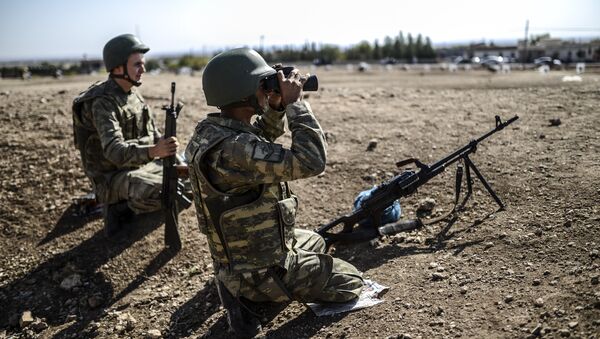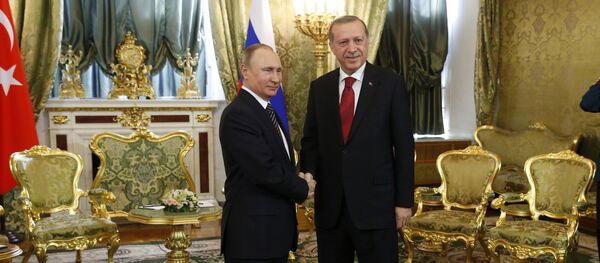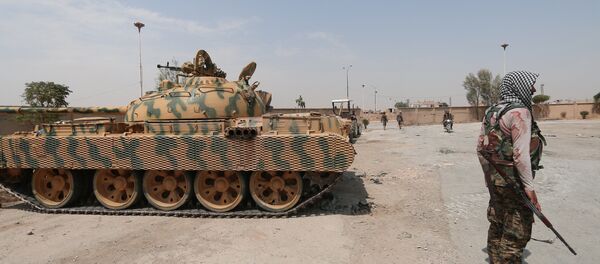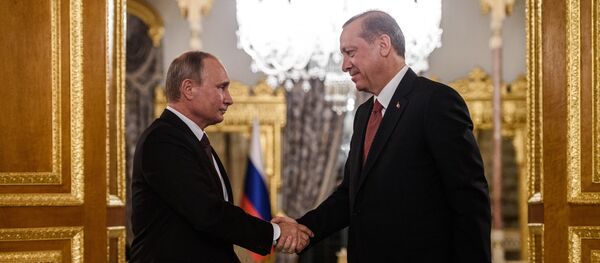However, according to the journalist, Turkey must preserve the fragile balance of power while maintaining ties with both Russia and the US; otherwise, Ankara may find itself involved in a fierce confrontation with either Moscow or Washington, or both.
Meanwhile, the Democratic Union Party (PYD), a left-wing Kurdish political party, is viewed by Ankara largely as an apple of discord.
"Having finished the 'al-Bab phase' of the Euphrates Shield Operation, the Free Syrian Army [FSA] backed by Turkey turned eastward and moved to Manbij. Turkey also declared Manbij and Raqqa its new targets. However, the recent developments indicate that it would not be easy for Turkey to achieve these goals," Çeviköz wrote.
Washington has repeatedly signaled that it will not give up its Kurdish allies in Syria. For its part, Russia also opposes any military escalation between the FSA and PYD, according to the journalist.
Apparently therefore, Çeviköz suggested, Russia proposed that that the PYD should leave western Manbij while the Syrian Arab Army takes the region under control.
According to the journalist, through this move Moscow has pacified the US and, on the other hand, ensured the PYD's withdrawal from the western areas of Manbij, as Turkey had insisted.
In response, Ankara signaled last week that it by no means opposes the establishment of the SAA's control over the northern Syrian city of Manbij.
"We do not consider the scenario, under which the Syrian army would enter Manbij, as a negative one. The Kurdish self-defense units are leaving the city. Syrian land must belong to the Syrians," Turkish Prime Minister Binali Yildirim said on March 5.
Speaking to Radio Sputnik "Loud & Clear" host Brian Becker, Russian political analyst Dmitry Babich dubbed Russia's move a "Solomon solution."
The Turkish journalist believes that if Ankara continues to pursue a pragmatic Syrian strategy it will become one of the most influential players in the region, which maintains ties with both Moscow and Washington.
In this context, the Friday meeting between Russian President Vladimir Putin and his Turkish counterpart Recep Tayyip Erdogan shows that Ankara remains committed to the Russo-Turkish normalization.
In his Thursday interview with Sputnik Turkiye, Turkish political analyst Kerim Has suggested that the offensives against Manbij and Raqqa are likely to become the focus of the Russo-Turkish talks.
"As far as I understand, negotiations over this very issue are still in process and will depend on the policies pursued by US President Trump. At this particular moment the positions of the parties are not set in stone," Has said.
Moscow continues to advocate involving the Syrian Kurds in the Geneva talks: it argues that the ongoing political crisis cannot be resolved with this ethnic minority sidelined.
For its part, Ankara considers the PYD an affiliate of the Kurdistan Workers' Party (PKK), which is designated as a terrorist organization in Turkey.
Has noted that it is still unclear whether Turkey will be able to reach a compromise with Russia over the differences regarding the PYD.
However, it appears that Turkey has no alternative.
"Taking into account the current situation on the ground [in Syria], we can say that Turkey is unable to unilaterally make a decision on its participation in a military operation to liberate Raqqa from Daesh. Such a decision can be made only if it convinces Russia and the US of the necessity of its participation," Has told Sputnik.




